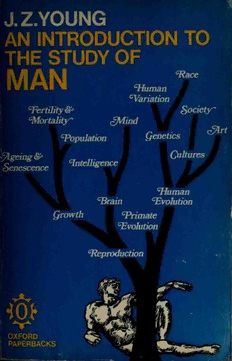Table Of ContentZ.Y
J.
AN INTRODUCTION TO
THE STUDY OF
MAN
liace
GHuman
cVariat
c
Fertility&
gm
cMortalitjr
pulation
&
Ageing _ „.
I
Evolution
cprimate
cEvolu
OXFORD
PAPERBACKS
AN INTRODUCTION
TO THE
STUDY OF MAN
AN INTRODUCTION
TO THE
MAN
STUDY OF
BY
YOUNG
Z.
J.
M.A., F.R.S.
PROFESSOR OF ANATOMY IN THE UNIVERSITY
OF LONDON AT UNIVERSITY COLLEGE
OXFORD UNIVERSITY PRESS
LONDON OXFORD NEW YORK
Oxford UniversityPress
OXFORD LONDON NEWYORK
GLASGOW TORONTO MELBOURNE WELLINGTON
CAPETOWN IBADAN NAIROBI DARESSALAAM LUSAKA ADDISABABA
DEI.HI BOMBAY CALCUTTA MADRAS KARACHI LAHORE DACCA
KUALALUMPUR SINGAPORE HONGKONG TOKYO
ISBN O 19 881333 3
©
OxfordUniversityPress1971
Firstpublishedigyi
FirstissuedasanOxfordUniversityPresspaperback
1974
Allrightsreserved.Nopartofthispublicationmaybereproduced,
storedinaretrievalsystem,ortransmitted,inanyformorbyany
means,electronic,mechanical,photocopying,recordingorotherwise,
withoutthepriorpermissionofOxfordUniversityPress
Thisbookissoldsubjecttotheconditionsthatitshallnotbywayof
tradeorotherwise,belent,re-sold,hiredout,orotherwisecirculated
withoutthepublisher'spriorconsentinanyformofbindingorcover
otherthanthatinwhichitispublishedandwithoutasimilarcondition
includingthisconditionbeingimposedonthesubsequentpurchaser
PrintedinGreatBritain
attheUniversityPress,Oxford
byVivianRidler
PrintertotheUniversity
PREFACE
This bookaroseoutoflecturesgiven tomedicalanddentalstudentsatthe
beginning of their studies. It is therefore literally an introduction to the
possibilityofstudyingman inascientificmanner. Todothisisnot'natural'
for most people, and indeed may seem actually repellent to some. Yet
doctors and dentists have found that by approaching our problems in a
scientificwaytheyhavebeenincreasinglyabletohelpus. Indeeditisalmost
true to say that it is only since medicine became scientific that it has been
abletobeofanyrealhelp incuringhuman ills. Itmay bethattherearestill
large areas ofman's activity in which we can be helped by more detailed
study. Many people fear that in some way this threatens an invasion ofthe
individual personality. It is important to respect this apprehension and at
all times to emphasize that the aim ofall scientific studies is to assist in the
improvementofthequalityofhuman lifeandtoenlargeitscapacities.
This book is the record ofthe search for a method by which this can be
done. Indeed it can be read as a sort of detective story in which we are
searching for an answer to the question 'What is man?' or, more subtly,
for the answer to 'What are good ways to study men?' We begin by asking
some conceptually rather simple and obviously 'scientific' questions such
as 'What are men made of?' This gives an opportunity to look at some of
the spectacular recent information that biochemistry has provided about
the large molecules in the body, and especially about the information-
carrying properties of the nucleic acids. Such knowledge provides com-
pletely new ways of talking about the old questions of the nature and
origin of life. These serve as preludes to the more specific questions we
are interested in about man himself. His life, like that ofother creatures,
is organized by the information that is received from the past, so that he
takes actions thatare likely to preserve his lifeand thatofhisspecies in the
future. An understanding ofthe origin and nature ofthis mechanism for
ensuring continued maintenance or homeostasis would go far to give us
that basic knowledge of the principles of life for which we are looking.
Certainly we have not achieved it yet, but there have been large advances
recently, and they revolutionize our knowledge of ourselves. To many
people this will seem a necessarily imperfect framework because, they
wouldsay,theessentialfeatureofamanishisdifferencefromothercreatures
inthathepossessesasoul,insomesensevaluablein itself.
Anyone proposing to study man must face this problem, and we shall
indeed attempt to do so. The answers will probably be found inadequate
PREFACE
vi
in many respects. Indeed many thoughtful people perhaps feel that we do
not know enough to be able to solve this or indeed any otherofthe funda-
mentalproblemsoftheoriginoftheworldorthemeaningoflife,andshould
frankly admit our ignorance. One of our recurrent themes will be that
human intelligence, for all its ability, is still very imperfect, but is improv-
ing fast. We shall try to look for new light on some ofthe problems that
have worried mankind forcenturies.
I am very conscious that such consideration as is given to these great
questions is very superficial compared to that of theologians and philo-
sophers who devote their lives to them. Certainly there is no substitute for
study of the works of those who have investigated man in all his many
aspects. Nevertheless the biologist has at least one special contribution to
make in that he studies the agent of study itself—the brain. The possi-
bilities and difficulties that this brings are major themes of the book. As
the investigation develops we shall meet repeatedly the particular paradox
ofhumanbiology,thatwearetryingtofindmethodsforstudyingthestudent
himself. Does this involve circular reasoning and if so how does it affect
ourwholeendeavour? These are very old and deepquestions ofthe theory
and nature of knowledge (epistemology). Although the biologist is not
trained to deal with such problems of logic and philosophy he finds it
impossible to avoid doing so. This is perhaps the mostserious ofthe many
ways in which the reader must be suspicious ofthis book. The intention,
however, is that he shall at least be stimulated to see some ofthe philo-
sophical problems that are involved in his ordinary scientific and everyday
ways of speech, even though the treatment is too superficial to provide
really satisfying answers.
Certainly no one discipline has a monopoly of the right to say what
men should do. The body ofhuman knowledge is now so vast that no one
setofpeopletrained inaparticulardisciplinecan providetheguidancethat
we need. We have to depend upon artists as much as priests, physicists as
wellasphilosophers,engineersandlawyers,historians,economists,doctors,
and politicians, to mention only a few. The course of human life today
dependsupon the knowledge ofall oftheseand a host more.
Ihopethatthefactsandattitudesrecordedherewillbefoundtobeuseful
and willgivesomesatisfaction and help todifferentsortsofpeople. What I
have aimed to do is to provide enough information to evoke the inspiring
spectacle ofthe vast range ofcontrolled activities that constitutes the life
ofmen and ofthe living world. With sufficient knowledge wecan now just
begintoimagineallthetensofthousandsofchemicalprocessesthatgoonin
an orderly way as one individual man or woman sits and thinks. We can
begin to see the wonderful complexity of the instrument in which the

